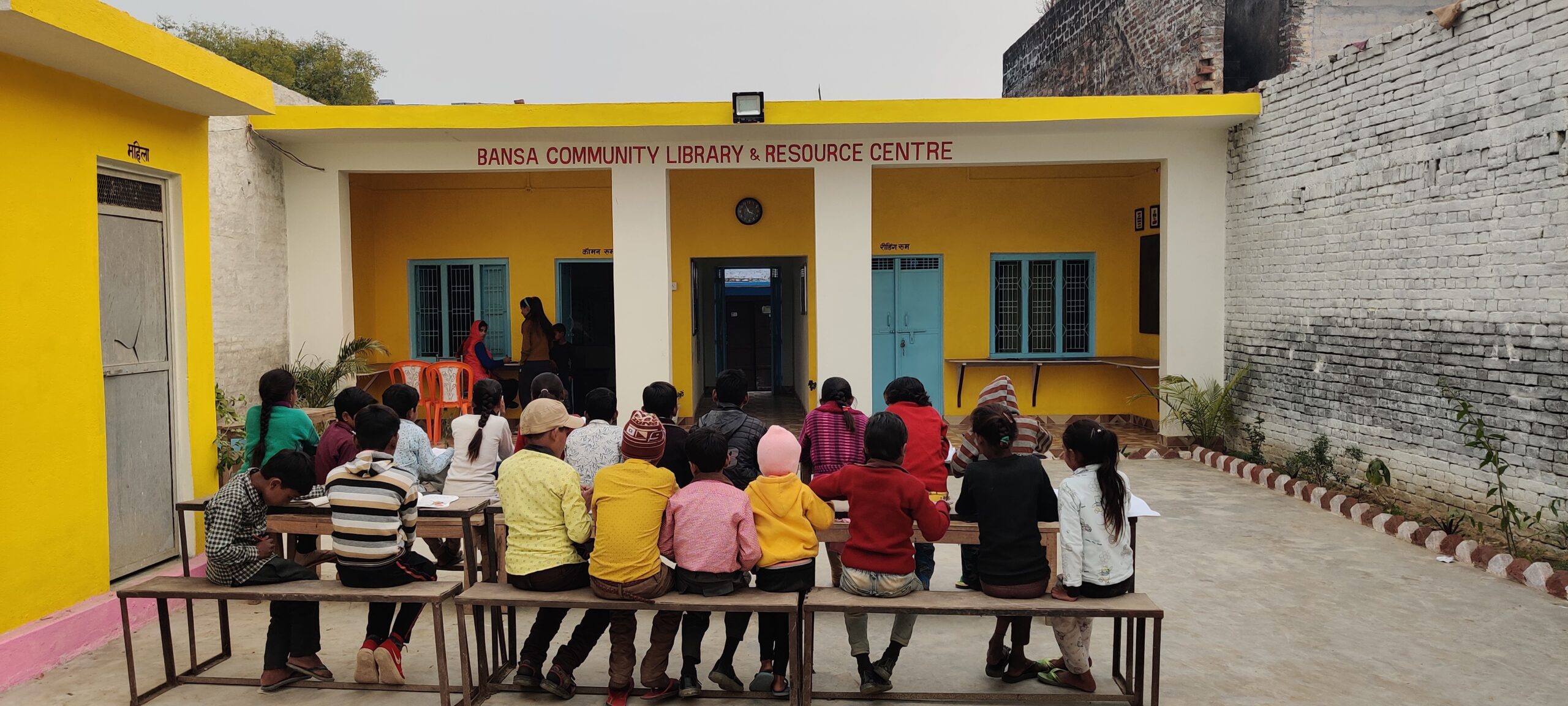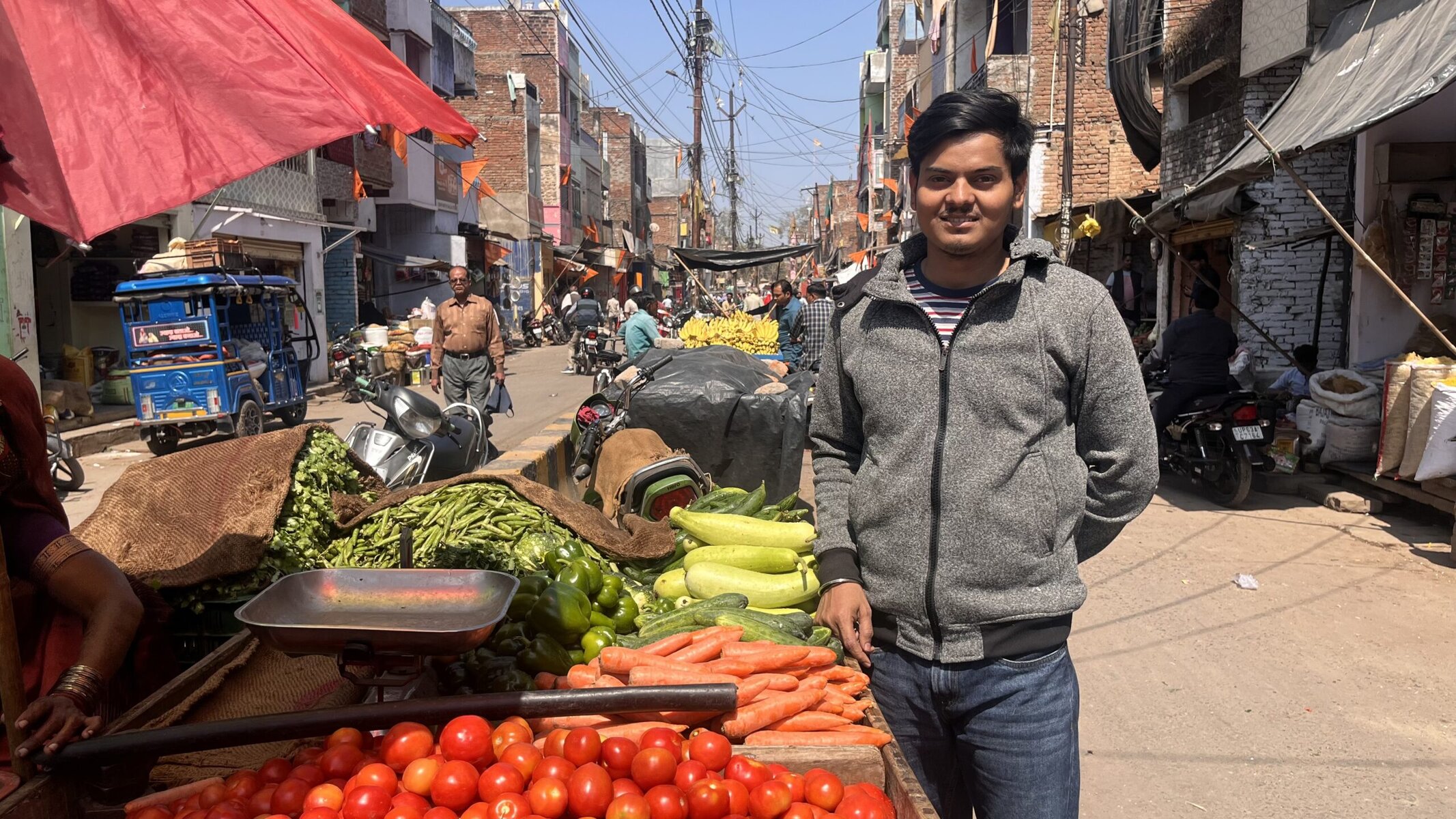Every morning, Amit Sonkar sets up his little stall in a bustling vegetable market in Mirzapur, a small town on the banks of the Ganges in North India’s Uttar Pradesh. He piles up the tomatoes and carrots in inviting pyramids and lays out the beans, spring onions and green chili peppers in baskets. Once he is satisfied with the array, he sits behind the stall and waits.
“Earlier, I’d have whipped out my phone and seen mindless reels on social media,” he says. But ever since a room behind a tiny shoe shop was converted into the Mirzapur Community Library next door, Sonkar has started reading, not because he has any exam to pass, but “for pleasure,” he says. It is a far cry from his days at school, the class 12 dropout says. “I’m reading a lot of Hindi literature, which takes me to different worlds and helps me to visualize a future beyond this crowded, crazy bazaar,” he says.
About 250 miles away, in Hardoi, another small town in the state, a community library operates out of the compound of the local temple. Children play with educational toys outside while a free competitive exam preparatory class takes place within. “We never ask people who come to the Bansa Community Library to read,” co-founder Jatin Lalit says. For many new readers, he feels that this could be too much pressure. Instead, they focus on providing a safe, peaceful space with lots of books. “We leave it to our members to choose whether to read, study, play or hone their computer skills.”
Such libraries are unusual for a region where literacy rates are at 68.5 percent (the national average is 77.7 percent), and a national survey found that barely 56 percent of class five students could read a text meant for students in class two. In the developed world, generously funded public libraries make it easy for people to access books. But not in rural India. Uttar Pradesh alone has merely 200 public libraries, but almost 98,000 villages at last count.

To make books more freely available, small community libraries are mushrooming across India. The Community Library Project (TCLP) in Delhi began in 2009 as a book club. It now has four branches in Delhi and gives 4,000 children free access to books. Over 1,000 miles away, NGO Hasiru Dala started the Buguri community library project in 2017 for waste-pickers in Karnataka. In the same state, 17 community libraries called Book Nests operate out of bus stops. Since 2022, the state transport provider Navi Mumbai Municipal Transport has introduced mobile libraries on several long-distance buses in Mumbai.
“The idea of such small community libraries is to make it as convenient as possible for people to pick up a book instead of playing with their phones,” Lalit says. “They are free to use, open to all and most don’t require a membership fee.”
Public libraries exist in some of these rural areas, but people often have trouble accessing them. “Hardoi district has a public library in the district center, but it charges an annual fee and is a long way off from most of the district’s villages,” Lalit points out. But the Free Libraries Network (FLN) — a coalition of free libraries, librarians and library activists in India and South Asia, of which Lalit is the general secretary — believes in free, unfettered access to books for all.
Weighed down by negative news?
Our smart, bright, weekly newsletter is the uplift you’ve been looking for.
Lalit, along with two other friends from a law school in Delhi, started Bansa Community Library in 2020 during the Covid lockdown. “We were helping migrant laborers return to their homes and realized that once home, they had little to do, and no opportunities to better themselves,” he recounts. “Building a free library, a community-owned safe space where they could read or study, seemed like a good idea.”
Near his home in Hardoi, Lalit, now a lawyer who practices in Delhi, convinced a local temple to let them construct two rooms on its land. The library took off with book and monetary donations. It gained initial momentum because the total lockdown had left children (and their parents) with little to do. Today, the library has 2,100 registered members, with over 100 coming every day. Its doors are always open, even at night, especially for students preparing for schools and competitive exams.
Rahul Mishra was one of the student volunteers who helped set up the Bansa library in 2020. “Even then, what I really wanted was to create a community library in Mirzapur, my home town,” he says. He got his chance when a relative who owns a shop in Mirzapur’s Mukeri Bazaar offered him a room, rent-free, that could accommodate 10 to 15 readers at a time. FLN gave him 100 books, several other donors pitched in and the Mirzapur Community Library was born in 2024.
Funds, however, are an eternal problem for these community libraries. “In the long run, we’ll need to rent a larger space,” Mishra says. He would like to hire a librarian to manage the Mirzapur Library and expand its outreach, but does not have the money for this yet. Lalit and Mishra face another problem: In rural India, girls and boys do not customarily sit together; neither do people belonging to different castes. Mishra recalls when a young boy belonging to a low caste stopped shyly outside the library: “We took days to convince him to come in. When he did, he was afraid to sit on a chair. Finally, when we convinced him to borrow a book, it felt like such a victory.”

Despite these challenges, rural library projects are relatively scalable and replicable. “You don’t need much to start — just a small space, local volunteers and books that people have donated,” Mishra says. He plans to install a television and hold weekly movie screenings to get more people to join. Lalit has already built the membership of Bansa Community Library successfully by offering film screenings; art, craft, dance and computer classes; prep for different competitive exams and free wifi. “We now have a program that encourages mothers to read,” Lalit says, “so that they can help foster a good reading environment at home for their children.”
Both libraries report a greater demand for books in Hindi. “One reason why I never took to reading in school is that our teachers forced English books on us,” says 17-year-old Sunny Sonkar, a third-generation vegetable vendor in Mukeri Bazaar. “Maybe that’s one reason why I dropped out of school.” He says he used to feel shy about admitting he could not read in English but enjoyed reading Hindi short stories and poetry. “No one tells me what to read in this library,” he notes, “and I like that.”
Meanwhile, another vegetable vendor, Ashish, says that after dropping out of school in class eight, he did not lose his interest in English books. “I can read anything, as long as it’s in English!” he says, showing me the encyclopedia he is currently reading. “Coming to the library helps me escape the crowds and noise of the bazaar.”
The quiet reading environment these rural libraries provide has made them a hub for many community activities. For example, at the Mirzapur Community Library, two local school teachers have started free tutorial classes in economics and physics for class 11 and 12 students. The Bansa Community Library hosts a monthly Kanoon ki Pathshala (School of Law), where villagers connect with an advocate online to learn about their rights and how to access legal assistance.
These libraries also help open up more opportunities to local youth. Mishra says they see a lot of demand for preparation guides for competitive exams. “Many people don’t have money to buy them as they’re very expensive, while better-off candidates have dozens of books and most also attend prep classes,” he says. “Being able to borrow them from the library puts [these students] on a relatively more level playing field in national level exams.” Lalit estimates that over 50 members have been able to pass different competitive exams after using the Bansa Community Library’s facilities, and hundreds have scored well enough in school to receive scholarships.
One of those students is Akash Patel, who prepared for the Staff Selection Commission exam (which selects candidates for government jobs) here instead of doing what many of his peers did, which was to migrate to bigger cities and join expensive coaching centers. “I could study undisturbed here, unlike at home, when there was something or the other to distract me,” he says. In 2023, he passed the exam and was appointed tax assistant in the state tax department.
Patel’s achievement is something most rural youth only dream of. In Mirzapur, as Sunny Sonkar laboriously reads a book of poetry that he found in the library, he says he dreams of a better future. “My family makes good money selling vegetables,” he says. “But reading poetry has made me realize there’s so much more to life.”
The post Community Libraries Are Spreading Across Rural India appeared first on Reasons to be Cheerful.




